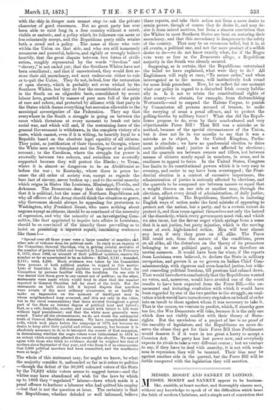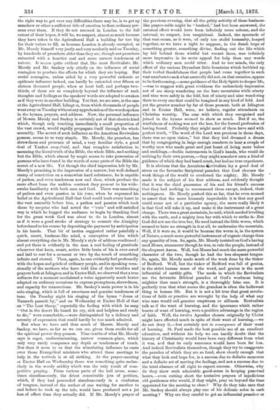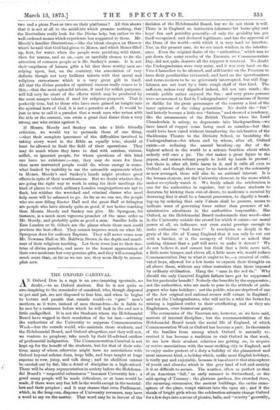MESSRS. MOODY AND SANKEY IN LONDON. ifESSRS. MOODY and SANKEY
appear to be business- In like, amiable, at heart modest, and thoroughly sincere men, without any knowledge to speak of of the difficulties which beset the faith of modern Christians, and a simple sort of conviction that the right way to get over any difficulties there may be, is to get up somehow or other a sufficient tide of emotion to float ordinary per- sons over them. If they do not succeed in London to the full extent of their hopes, it will be, we suspect, almost as much because they have taken in the Agricultural Hall a building far too big for their voices to fill, as because London is already occupied, as Mr. Moody himself very justly and very modestly said on Tuesday, -by hundreds of preachers abler than they are, though not preachers animated with a heartier zeal and more earnest tenderness of nature. It seems quite evident that, like most Revivalists, Mr. Moody and Mr. Sankey rely chiefly on the influence of social contagion to produce the effects for which they are hoping. But social contagion, unless aided by a very powerful endemic or epidemic influence indeed, can hardly be extended over fifteen or sixteen thousand people, when at least half, and perhaps two- thirds, of them are as completely beyond the influence of such thoughts and feelings as the speakers' words are adapted to awaken as if they were in another building. Yet that, we are sure, is the case atthe Agricultural Hall, Islington, from which thousands of people went away on Tuesday without any apprehension of the words spoken in the hymns, prayers, and address. Now, the personal influence of Messrs. Moody and Sankey is certainly not of that electric kind which, though only, touching, immediately a small proportion of the vast crowd, would rapidly propagate itself through the whole assembly. The secret of ouch influence as the American Revivalists 'possess, seems to us very simple. Mr. Moody, the preacher, has shrewdness and presence of mind, a very familiar style, a good deal of Yankee sang-froid, and that complete satisfaction in assuming the literal truth of the Bible, the whole Bible, and nothing bat the Bible, which almost by magic seems to take possession of persons who have found in the words of some parts of the Bible the. secret of a new life. Yet though the chief impression left by Mr. Moody's preaching is the impression of a narrow, but well-defined stamp of conviction on a somewhat hard substance, he is capable • of pathos, and even tenderness now and then, which produce the more effect from the sudden contrast they present to his wide- awake familiarity with both man and God. There was something of pathos and even passion in his tone,, when he expressed his belief at the Agricultural Hall that God could hush every heart in the vast assembly before him, a pathos and passion which took those by surprise who had noted the "cute" and self-satisfied way in which he begged the audience to begin by thanking God for the great work God was about to do in London, almost as if it were a good stroke of strategy to commit the Almighty beforehand to his-course by depositing the payment by anticipation in his hands. That bit of tactics suggested rather painfully a quick, smart, business-like mind, a conception of him which almost everything else in Mr. Moody's style of address confirmed ; -and yet there is evidently in the man a real feeling of gratitude whenever that keen, smart, active little brain of his is over-awed and laid to rest for a moment or two by the touch of something Infinite and eternal. Then, again, he can evidently feel profoundly With the hopes and griefs of ordinary people, and in Speaking occa- sionally of the mothers who have told him of their troubles and prayers both at Islington and in Exeter Hall, we observed that a true softness for a moment modulated a voice apparently much better adapted on ordinary occasions to express promptness, shrewdness, and capacity for transactions. Mr. Sankey's main power is in his solo-singing, which is fell of sweetness and genuine tenderness of tone. On Tuesday night his singing of the hymn "Jesus of Nazareth passeth by," and on Wednesday at Exeter Hall of that --on "The Lost Sheep," especially the feeling with which he sang " Out in the desert He heard its cry, sick and helpless and ready to die," were remarkable,—were distinguished by a delicacy and serenity of expression that could hardly be too much admired.
But when we have said thus much of Messrs. Moody and Sankey, we have, as far as we can see, given them credit for all the spiritual power they possess. Nine-tenths of what Mr. Moody says is eager, undiscriminating, narrow common-place, which only very rarely compasses any depth or tenderness of touch. Nor does it seem to us that the stimulating influence he casts over those Evangelical ministers who attend these meetings to help in the revivals is at all striking. At the prayer-meeting at Exeter Hall on Wednesday there was something quite melan- choly in the wordy aridity which was the only result of com- petitive praying. From various parts of the hall arose, some- times simultaneously, the driest conceivable jets of petition, which, if they had proceeded simultaneously in a confusion of tongues, instead of the author of one waiting for another to end before he took up the tale, would have produced not a jot less of effect than they actually did. If Mr. Moody's prayer of
the previous evening, that all the gritty activity of these business- like prayer-mills -might be "hushed," had but been answered, the external effect would have been infinitely more solemn, and the internal, we suspect, less unspirituaL Indeed, the spectacle of that vast ocean, as it were, of .only to stolid humanity, heaped together, as we have a right to suppose, in the dumb hope of something greater, something divine, finding out the life which lay hid behind those- wistful but vacant faces, was infinitely more impressive in its mute, appeal for help than any words which ordinary men could utter. And to our minds, the only effect of the various Dryasduet little fountains which bubbled up their verbal thankfulness that people had come together in such vast numbers to seek what assuredly did not, on that occasion, appear to be forthcoming,—some guidance of the Holy Spirit to deeper life, —wag to suggest with great vividness the melancholy impression not of one sheep wandering on the bare mountains while ninety and nine were safely in the fold, but of ninety and nine wandering there to every one that could be imagined in any kind of fold. And yet the greater number by far of those present, both at Islington and in Exeter Hall, , were, we believe, regular attendants on Christian worship. The ease with which they recognised and joined in the hymns seemed to show as much. But if so, the wistfulness of seeking was not the less, for the formal profession of having found. Probably they might most of them have said with perfect truth, "The word of the Lord was precious in those days, there was no open vision," but that they had dreamed a dream that by _congregating in large enough numbers to hear a couple of worthy men who made great and,.jnat boast cL being mere babes and sucklings,—feeble instruments in God's hands, who could do nothing,by their own powers, —they might somehow earn a kind of guidance of which they had heard much, but had no true experience.
It is obvious that the Americanelievivalists lay ,a good deal of stress on the favourite Seriptural paradox that God chooses the weak things of the world to confoundd, the mighty, Mr. Moody made it the subject of his first address, and evidently thought that it was the chief guarantee of his and his friend's success that they had nothing to recommend them except,. indeed, their nothingness. Mr. Moody pushed this so far, that he even seemed to assert that the more humanly improbable it is that any good could come o,ut of a particular agency, the more really likely it is that God will take it up, and make it the instrument of a great change. There was a great mountain, he said, which needed levelling with the earth, and a mighty iron bar with which to strike it-- Rut God did not use the iron bar, He used insteadthe little worm, which seemed to have no strength in it at all, to undermine the mountain. Well, if it were so, it would be because the worm is, in the system of Nature, a much more powerful instrument of organic change than any quantity of iron. So, again, Mr. Moodyinsisted on God's having used Moses, stammerer though he was, to rule the people, instead of the eloquent Aaron. Well, but Moses had much the more powerful character of the two, though he had the less eloquent tongue. So, again, Mr. Moody made much of the work done by the tinker of Bedford. Well, but the tinker of Bedford was full of genius, in the strict human sense of the word, and genius is the most influential of earthly gifts. The mode in which the Revivalists use the favourite Biblical paradox of God's weakness being mightier than man's strength, is a thoroughly false one. It is perfectly true that what seems the grandest is often the hollowest thing in human life. But it is not a bit true that great revolu- tions of faith or practice are wrought by the help of what any wise man would call genuine emptiness, or silliness. Revivalists talk as if the want of learning, and the ignorance which rather boasts of want of learning, were apositive advantage in the region of faith. Well, the twelve Apoatles chosen originally by Christ might have effected much in spite of their want of learning,—we do not deny it,—but certainly not in consequence of their want of learning. St. Paul made the best possible use of an excellent education, and without his help we can hardly doubt that the history of Christianity would have been very different from what it was, and that its early successes wordd have been far less. And indeed Revivalists themselves, though they try to exaggerate the paradox of which they are so fond, show clearly enough that what they look and hope for, is a success due to definite measures and a definite art of moving the feeling, and not a success due to the total absence .of all right to expect success. Otherwise, why do they show such admirable ,good-sense in keeping punctual hours, —even cutting short the tentative prayers of injudicious old gentlemen who would,- if they might, pray on beyond the time appointed for the meeting to close ? Why do they take care that Mr. Sankey should always play one of his delicate solos in each meeting ? Why are they careful to get an influential preacher or two and a pious Peer or two on their platforms ? All this shows that it is not at all to the accidents which promise nothing, that the Revivalists really look for the Divine help, but rather to the well-ordered means which experience has suggested to them. Mr. Moody's familiar illustrations,—like the blank cheques on Heaven which he said that God had given to Moses, and which Moses filled up, first, for water, when the people were perishing with thirst, then for manna, and so on,—are as carefully chosen to fix the attention of common people as is Mr. Sankey's music. It is not their emptiness of human gifts a bit that these worthy men are relying upon, but, on the contrary, the association of very definite though not very brilliant talents with that moral and religious earnestness which is a very great gift in itself. All that the divine paradox of spiritual success really comes to is this,—that the most splendid talents, if used for selfish purposes, will fall very far short of the effects which may be produced by the most meagre talents, if used for religious purposes. That is perfectly true, but to those who have once gained an insight into the spiritual laws of God, it is not a paradox at all. It would be just as true to call it a paradox that a weak man who swims with the tide or the current, can swim a great deal faster than a very strong one who swims against it.
If Messrs. Moody and Sankey can take a little friendly criticism, we would try to persuade them of one thing, —that their complete ignorance of the difficulties involved in taking every word in the Bible as equally true, should at least be allowed to limit the field of their operations. They may do much where they have to deal with careless, vicious, selfish, or ignorant people, for whom questions of this kind can have no existence ;—nay, they may do more for them than more instructed people could do, whose energy is some- what limited by inability to use the untenable arguments which in Messrs. Moody's and Sankey's hands might produce good effects in spite of their worthlessness. But we doubt whether they are going the right way to work in using for their meetings the kind of places to which ordinary London congregations are apt to flock, but whither the wretched and criminal classes who need help most will be ashamed to go. As far as we can see, the people who are now filling Exeter Hall and the great Hall at Islington are people who have already quite as good, if not better teaching than Messrs. Moody and Sankey can give. Mr. Spurgeon, for instance, is a much more vigorous preacher of the same order as Mr. Moody, and probably quite as good a man. Smaller halls in East London or St. Giles's are the places where these men could produce the best effect. They cannot improve much on what Mr. Spurgeon does for ordinary Baptists. They will never come near Mr. Newman Hall or Mr. Baldwin Brown in the depth and manli- ness of their religious teaching. Let them trust less to their doc- trine of divine paradox, and more to the honest appreciation of their own moderate but very genuine gifts, and they will accomplish much more than, as far as we can see, they seem likely to accom- plish now.




































 Previous page
Previous page